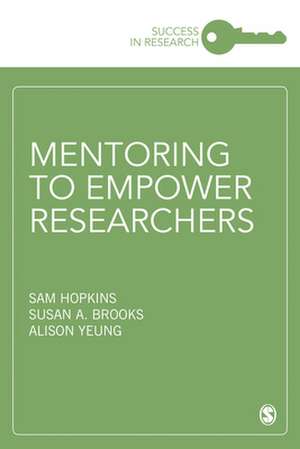Mentoring to Empower Researchers: Success in Research
Autor Sam Hopkins, Susan A Brooks, Alison Yeungen Limba Engleză Paperback – 17 dec 2019
• Mentorship for transition points,
• Skills development needed for publication, funding application and networking,
• Mentorship for performing supervision duties.
This is a practical and easy-to-use guide that draws on the editors’ extensive experience, and an invaluable tool for practitioners, career advisors and academics working in research and skills development.
| Toate formatele și edițiile | Preț | Express |
|---|---|---|
| Paperback (1) | 341.33 lei 6-8 săpt. | |
| SAGE Publications – 17 dec 2019 | 341.33 lei 6-8 săpt. | |
| Hardback (1) | 795.73 lei 6-8 săpt. | |
| SAGE Publications – 17 dec 2019 | 795.73 lei 6-8 săpt. |
Preț: 341.33 lei
Nou
65.33€ • 70.99$ • 54.92£
Carte tipărită la comandă
Livrare economică 21 aprilie-05 mai
Specificații
ISBN-10: 1526465116
Pagini: 240
Dimensiuni: 156 x 234 x 14 mm
Greutate: 0.41 kg
Ediția:1
Editura: SAGE Publications
Colecția Sage Publications Ltd
Seria Success in Research
Locul publicării:London, United Kingdom
Recenzii
This book is an essential aid for anyone interested in how researchers can be supported too develop through mentoring. It not only tells us, it shows us, how mentoring can be applied as a range of programmes and practices to enable researchers to build their awareness and confidence, and to move towards the career outcomes they choose for themselves. The book is centred on a deep understanding of research learning and research cultures, and offers very practical ways for Researcher Development professionals to leverage and strengthen supportive relationships for early career colleagues.
This is the definitive playbook for researcher mentees, mentors, and those who support their development. If you are considering or embarking on a mentoring relationship in the research environment (and beyond the hallowed halls of the academy), then you will gain considerably from the guidance and advice that this book has to offer.
The authors have succeeded in creating a unique resource that is both comprehensive and concise; it sets out general principles and at the same time documents specific applications. This book provides harmonious advice and practical activities to benefit all parties in any permutation of a mentoring relationship in research.
Cuprins
Chapter 2 Mentoring for those entering doctoral education
Chapter 3 Mentoring for early career researchers
Chapter 4 Mentoring for academic progression and promotion
Chapter 5 Mentoring to promote cultural awareness
Chapter 6 Mentoring for the transition out of academia
Chapter 7 Mentoring to Support Publication
Chapter 8 Mentoring to support grant success
Chapter 9 Mentoring to support networking
Chapter 10 Mentoring to support development of spoken communication skills
Chapter 11 Incorporating good mentoring principles into doctoral supervision
Chapter 12 Incorporating good mentoring principles as a Principal Investigator
Chapter 13 Reverse Mentoring
Notă biografică
Sam studied BSc Zoology in the UK and then completed her MSc and PhD in South Africa. Following completion of her doctorate, she held positions as a Tutor and then a Lecturer at the University of the Western Cape. She then continued her post-doctoral research career in biological sciences at the University of Surrey and spent a short time at the Zoological Society of London creating a course for research fellows. Sam then became mentoring lead for the doctoral college at the University of Surrey working within the Researcher Development Programme. Sam is now applying these experiences to her role at Surrey where she works as a teaching fellow on the foundation year programme in the department of biosciences. .












